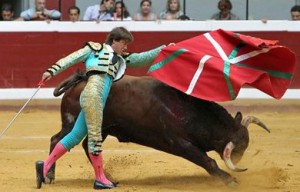
During a visit to Gipuzkoa recently, it was hard at first to gauge how important the Basque regional elections are to people there. Today marks a year to the day since ETA announced the “definitive” end of its campaign of violence and Sunday’s vote will be the first without the terrorist group’s shadow looming large.
And yet, when I talked to locals about what all this historic fact meant to them, many replied that rather than celebrating the peace, they were fretting about the economy. The Basque Country has weathered Spain’s crisis better than most, but it still has a jobless rate of 15 percent.
“People are thinking so much about how to make ends meet that the other stuff doesn’t enter their minds so much,” said José Andrés, the owner of a bar in Eibar.
And the polls could well back up this mindset on Sunday. Patxi López’s Socialists, who see the year-old peace as one of their great achievements, will probably be punished by voters, as will their partners in government, the Partido Popular. Despite their efforts to the contrary, they will shoulder at least some of the blame for the economy-related gloom. The Basque Nationalist Party (PNV) is expected to win, followed closely by the radical nationalists of Bildu.
But others, who have witnessed all too closely the brutal drama of the Basque Country over the decades, do attach more significance to Saturday’s anniversary and Sunday’s vote.
Gorka Landaburu is a journalist whose own story is virtually inseparable from that of the region over the last 40 years. His nationalist father was a deputy president of the Basque government before the Civil War, after which he went into exile in France, where he helped the Resistance.
Gorka was born and raised in France and returned to the Basque Country in the early seventies, at the age of 20. He joined an early, non-violent incarnation of ETA, when it was an anti-Francoist movement, inspired by the events of France’s May of ’68.
“Nobody can tell me that I don’t understand Basque nationalism,” Gorka told me. “I started imbibing it from the moment I was born.”
In the early eighties, having left political activism behind and become a journalist, he started receiving threats from ETA due to the tone of his articles, which were too moderate and anti-violent for the terrorist group’s liking. The threats would come in different forms: graffiti painted on his door, a black tie left in his letter box, a Molotov cocktail thrown at his house.
But he was never hurt until one day in 2001, when he got out of the shower and opened a package that had been delivered to his house. It exploded in his face, blinding him in one eye and blowing several fingers off.
Over the next 11 years he was assigned bodyguards, who followed him everywhere – until the beginning of this year, that is, by which time, ETA’s rejection of violence was taken seriously.
“Violence isn’t justified in a democracy,” he says, looking out across the Cantabrian Sea opposite his hometown of Zarautz, near San Sebastián. “We’ve lived through a dictatorship and we know what it means not to be able to vote and so on. The solution is to talk.”
Gorka’s refusal to bend to the extremism of either side – particularly the kind of anti-nationalist vitriol so prevalent in Madrid – is extraordinary. He calls it “common sense” and it even extends to meeting and talking with former members of the ETA cell which organised the attempt on his life.
With the Basque political scene particularly fractured with the arrival of pro-independence coalition Bildu and with nationalism in Catalonia sparking seemingly irrational responses on both sides, Gorka Landaburu’s calm is a lesson to the politicians in both the northern region and the rest of Spain.
“I’ve buried too many friends,” he says, before adding: “There’s no need to be afraid of dialogue. Bombs and guns are what we should be afraid of.”
The ugly irony is that today’s “anti-nationalist vitriol” from Madrid is of course itself the most unreformed and unsophisticated form of nationalism available in Spain, the minority forms of nationalism having been reformed by contact with “common sense” to become pluralist and unreproachably democratic movements.
So in today’s political scene we have ERC accepting Castilian as an official language in Catalonia and Bildu renouncing political violence while at the same time a government minister can quite proudly state that the aim of the Spanish education system is to indoctrinate children to be good Spaniards.
So old-style “rancid”, unreconstructed, bigoted nationalism now seems to be the preserve of a few dinosaur fringe groups in Catalonia and Euskadi, as well as the main domestic policy of the national PP government in Madrid.
Good God, what a lot of drivel, Murphy!
If ERC are so keen to kindly “accept” the language spoken as mother tongue by more than half of the Catalans, Spanish, what are they waiting for, what did they wait for when they were in power? When will they allow it back into the schools on an equal basis with Catalan??? Ditto in the Cat. Admin., and stop fining people who would like to use it in their businesses.. such “mala leche” will go away when they get what they want, is that it? Or might this have something to do with the upcoming elections, perhaps?
Meanwhile, in Madrid. Sr. Wert FINALLY raised the Government’s head and recognized the 3 decades of indoctrination carried out on Catalan children by the Catalan education system (heavens! you forgot that, didn’t you!), designed to produce rejection and scorn for all things Spanish. He suggested educating them to be proud of being both Catalan AND Spanish….the latter being the one that needs most work. By far.
Such hypocrisy. The Cat. nationalists are veritable masters at “el mundo al reves”. And you’re obviously hooked, though it’s hard to fathom why.